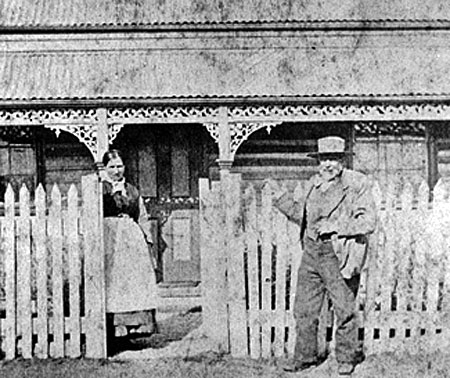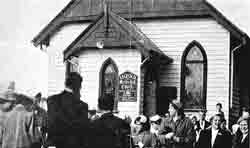

Reuben and Louisa Brinsmead
Henry and Jemima Brinsmead
CJ and Laura Brinsmead
The Barker Family
John Brinsmead from Exeter
More Australian Brinsmeads
The most prolific of the eleven Australian Brinsmead lines stems from William and Ann Brinsmead who left St. Giles in the Wood to settle near Leopold, (now Kensington) a little South of Geelong in Victoria.
William Brinsmead was born in St. Giles in the Wood in 1815, the son of William Brinsmead and Mary Ireland. He was one of six children, two boys and four girls. His father died in 1838. We do not have a census record for William in 1841. By the time of the 1851 census he and Mary were in Australia.
William married his cousin Ann Brinsmead, a daughter of Thomas Brinsmead and Margery Squire who lived on a farm in St. Giles Village. They were married on December 2, 1839 at the Methodist Chapel, presumably the one built on Ann's father's farm right beside the farmhouse. The couple had three children before they left, all baptised in the Methodist Church. They were Thomas Ireland (1841), Mary Ann (1844) and William (1847).
William's brother Henry married Ann's sister Betsy Brinsmead, who had previously married John Hackwill but was by then a widow. Henry and Betsy also emigrated to the Geelong area. We have no information that they went out together but they were certainly in contact once there. Another family member to emigrate to the area was Elizabeth, the youngest surviving daughter of Thomas and Magery Brinsmead and Betsy and Ann's young sister.
 William and Ann Brinsmead at Allens Week Farm.
William and Ann Brinsmead at Allens Week Farm.
The family arrived in Adelaide on the Lady McNaughton on June 15th 1850 and then disembarked in Williamston some days later (on the outskirts of Melbourne) and made their way South to Geelong. William and Ann settled on a beautiful spot adjacent to Lake Connewara. They built up the farm house in several stages and it is still there. They named the farm "Allens Week Farm" no doubt after the Allens Week farm in St. Giles in the Wood.
Their next child, Elizabeth's birth is registered in Australia and her birth place is shown as Heads (1851) which is probably Barwon Heads, immediatly south of the Lake Connewarre farm. William is described as one of the early English squatters in the area; apparently a reference to those who simply settled on raw land before the formal settlement or selection process was established.
Once settled, the family grew, with twins Reuben and Henry arriving in 1856. Two more children Edwin and Eliza were born but died at or soon after birth in 1860 and 1861 respectively. There has been some suggestion the couple also had an child named Fred, but we have found no record of such a birth and suspect this is a mistaken reference either to Thomas Ireland's son Frederick William or else Reubin's son Frederick Stuart.
Brinsmead's Farm, Leopold, Victoria - Allens Week
The Geelong Advertiser, on January 17th, 1860, announced the death "On October 19th, at Kensington, Queenscliff Road, Eliza, youngest daughter of Thos. Brinsmead, near Great Torrington, Devonshire, England, age 32, deeply regretted by all who knew her. Home papers please copy." This was Ann's younger sister. In 1862, William was admitted to the Geelong Infirmary, but the record do not show for what or for how long. In April, 1864 William Brinsmead offered for sale 50 acres of fenced farmland with a cottage, stabbling, and a dairy, located about 8 miles from Geelong on the Queenscliffe Road.
William and Ann Brinsmead carried their strong Methodist faith with them to Australia. There were several Methodist families in the Kensington (Leopold) area, some Primative Methodists, others like William and AnnWesleyans. Another couple of similar faith was Henry and Margaret Barker who settled nearby. The Barkers were the parents of the two sisters who married the Brinsmead twins, Henry and Reuben. The Church's Centenary Book, published in 1960, records:
Early in 1855 one Richard Bowman, newly arrived from England,walked out from Geelong according to him 'along six miles of moderate road, quite straight, passing a few inns and a few houses or rather huts.' He was on his way to William Brinsmead's farm overlooking LakeConnewarre to attend one of the first Methodist services in Leopold; then known as Kensington....
The First Service
It is not quite certain whether the first Methodist services were held in William Brinsmead's kitchen or Henry & Margaret Barker's who lived near the Melaluka Estate. Melaluka road still survives. The Brinsmeads were Wesleyans and the Barkers were primative Methodists, but a man known as William Williams recalls the kitchen services where flitchesof bacon and ropes of onions hung from the rafters and old muzzleloading guns and two big pistols hung on the walls. The great stone fireplace was a favourite place for Roman Catholicsand Protestants alike, as they gathered around the open fire in good fellowship of the Methodist service.
Another entry in the same book records:
The relationship between the Primative Methodists and the Wesleyans is not clear but we know that William Brinsmead also gave an acre of land at Kensington. The Minute appearing in the Statement of church Property of the Wesleyan Geelong Circuit on March 1st, 1857 succintly states, "Mr. Brinsmead must give a Deed." They did not waste any words in those days!
 The Leopold Methodist Church
The Leopold Methodist Church
A contemporary account of the building of the first Methodist Church dates it a little earlier. The Geelong Advertiser reported, on November 23, 1855:
The Wesleyan Church - During the last few weeks the Wesleyans of Kensington have put forth their energies in the erection of a small place of worship on the estate of Mr. Brinsmead, near the western banks of Lake Connewarra, and on the left side of the road to Queenscliffe, about seven miles from town. Half an acre of land, and other liberal contributions having been given by Mr. Brinsmead , and others in the neibourhood having taken up the matter with spirit, a neat little chapel to contain eighty persons is now completed, and was opened for devine worship by the Superintendent Minister, the Rev. Isaac Harding, of YarraStreet, Geelong, on Sunday the 11th inst. Yesterday, a special meeting was held, and about eighty friends sat down to tea; after which several interesting addresses were delivered, and collections were made which, together with a few small sums expected from friends who were unavoidably absent, will fully satisfy all debts contracted on account of the building.
A few newspaper reports from the time make it clear that the Moolap - Leopold area South of Geelong was very much a frontier. In April, 1866, the Brinsmead twins, by then 11, ran afoul of one of their neighbours, Thomas Ash, for repeatedly, and despite several warnings, trespassing on his land. They prefered to walk across his right of way, unlocking his gate, despite signs and warnings to the contrary. The Magistrate called their actions reprehensible and very high handed, fining them each £10 and costs.
The Geelong Advertiser (the "Ady") report from October, 1877 demonstrates, at 21, the Brinsmead twins' still had a less than deferential view of local law enforcement:
The Brinsmeads, of Kensington, would appear to be a very happy family. At the County court , yesterday, a young man named Reuben Brinsmead was summoned to show cause why he should not be compelled to pay the amount of a verdict given against him at a previous sitting for carelessly using fire, to the injury of a neibourgh of his named Richardson. When put in the witness box the young fellow put on a very indifferent air, and on being questioned by a solicitor with reference to his means, he cooly informed him that he had no property, took no wages; in fact worked for nothing. He said he worked with his father, and was quite content to get pocket money when he wanted it. "Have you not bought things in your own name?" asked the solicitor. "No," replied the wary individual; "I have purchased things, but if I have not got enough money I always tell them to go to father and he'll give them the money." He subsequently amused all the Court by stating that "he took no thought for the morrow." A brother of this witness was afterwards put in the box, and he fully bore out the statement of his brother with reference to his receiving no wages. He said he received none himself, but, in answer to Mr. Cock, said he "did take thought for the morrow."
An article in the Advertiser earlier that year described the event that led up to the case, at the same time providing a description of the Brinsmead farm and the neibouring properties. The Brinsmeads had a paddock consisting of grassland. A man named Wallace had a 40 acre piece of grassland next door and, beyond that, Richardson had a garden with an apple and pear orchard. Reuben Brinsmead, in order to burn out a snake, set fire to a log, but without suffcient precautions to prevent the fire speading. The surrounding grass caught fire and the fire spread right across Wallace's grassland to Richardson's orchard and garden, burning down four or five chains of fencing in the process. Richardson was not well pleased.
The farm must have been somewhat mechanised. An add in the Addy on November 18, 1879 offered for sale (cheap!) a secondhand Threshing Machine; apply to W. Brinsmeade (they spelt the name wrong even then), Kensington.
Ann Brinsmead died on January 27, 1889, at age 70, at her residence on Balliang Street, Geelong. Her funeral took place two days later and she was buried in the Eastern Cemetry, Geelong.
Once Henry and Reuben had taken over the farm, William moved into Geelong, where one of his tasks was to look after the garden in the Methodist Cemetry.
Great Grandson Reg Brinsmead recalled the old Brinsmead homestead, Allens Week Farm, very well. He recalls the house was beutifully finished, complete with a Brinsmead piano (later in the possession of his sister Roma).